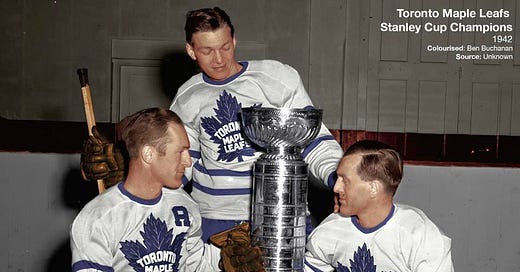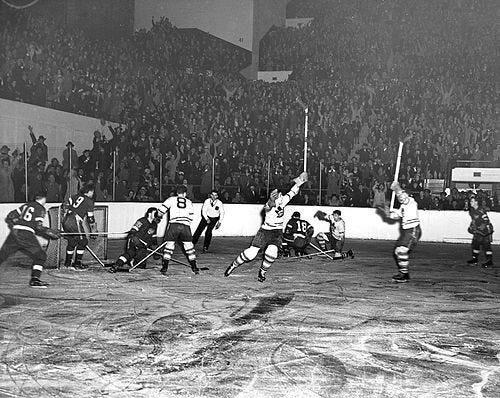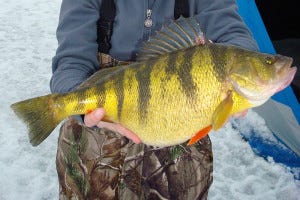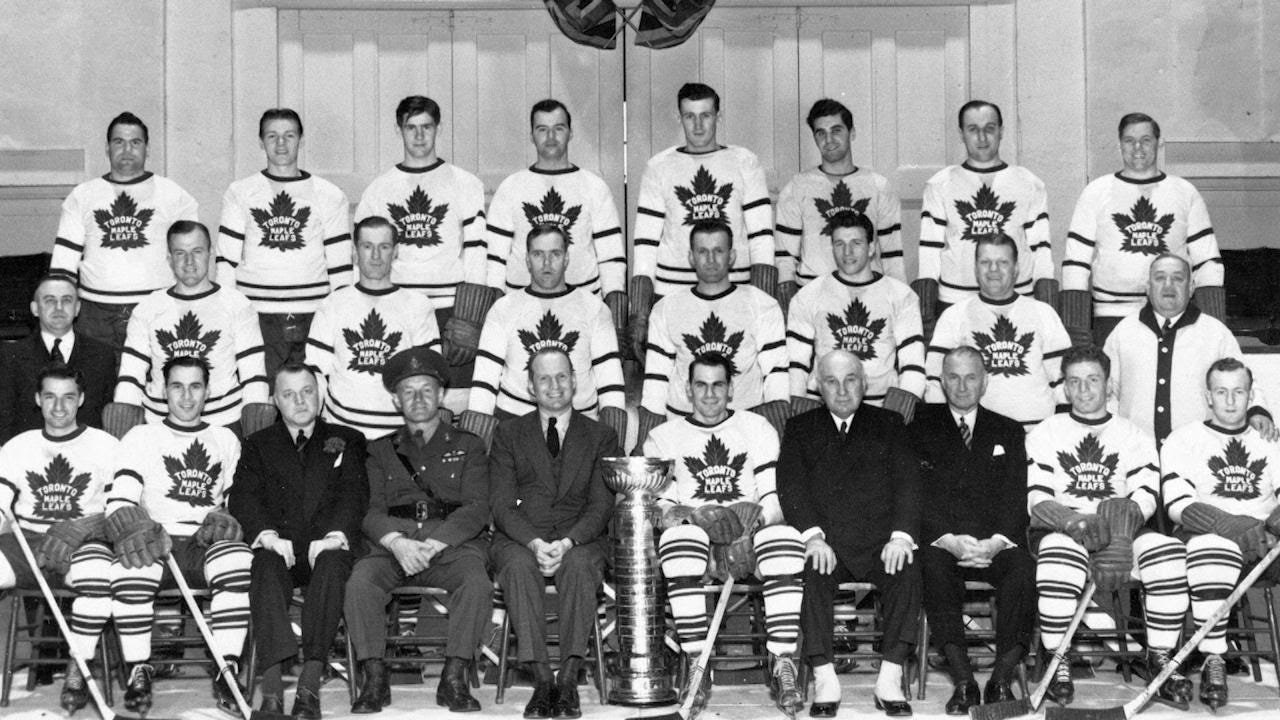The Comeback Story of the 1942 Toronto Maple Leafs
The only team in NHL history to overcome a 3-0 deficit to win the Stanley Cup, the 1942 Toronto Maple Leafs have an interesting story to tell.
From April 4th to April 18th, the Toronto Maple Leafs faced the Detroit Red Wings in the 1942 Stanley Cup Finals. 3 years into World War II, hockey stayed an ever constant. After losing the first three games of the series, the Leafs pulled together an astounding comeback, one that would be a standalone in NHL history, to win the next four straight games and defeat the Red Wings. This series also being the first Stanley Cup Final in NHL history to go to 7 games.
In the first round, the Leafs faced the New York Rangers in a 4-2 series win to advance to the second round where they faced the Montreal Canadiens. This series once again went to Toronto’s favor in a 2-1 series win. The Leafs then went to the Eastern Conference Finals against their forever rival, the Boston Bruins, to defeat the Bruins in a 2-0 sweep and advance to the Stanley Cup Finals.
Old Time Playoff Hockey
Game 1 was hosted in Toronto. Detroit's Don Grosso opened the scoring in the second minute of play before John McCreedy tied it for Toronto in return. Detroit’s Sid Abel one more goal ahead, only to have Toronto’s Sweeney Schriner tie it to leave the teams tied after the first period. Grosso scored again at the 14:11 mark of the second and the Wings held off the Leafs for the rest of the game to win the opening game 3-2.
Detroit took Game 2 in Toronto by a score of 4–2. Don Grosso scored two goals again for the Red Wings. The Wings took the lead 2–0 after the first period on goals by Grosso and Mud Bruneteau. Schriner scored in the second for the Leafs to close the score to 2–1 after two periods. Grosso scored early in the third along with Gerry Brown to put the Wings ahead 4–1 before Wally Stanowski scored in the fifteenth minute for the Leafs. Detroit taking the series lead 2–0.
In game 3 in Detroit, the Maple Leafs took an early 2–0 lead on goals scored by Lorne Carr, but the Wings tied it before the end of the first period on goals by Gerry Brown and Joe Carveth. Late in the first period, Sid Abel had to leave the game with a possible fractured jaw. His replacement, Detroit’s Pat McReavy, scored the winning goal early in the second, and Syd Howe added another to put the Wings up 4–2 after two. Eddie Bush scored for the Wings in the third to pad the final score to 5–2.
In Game 4, held in Detroit, the Maple Leafs staved off elimination with a glorious 4–3 victory. Toronto coach Hap Day scratched Gordie Drillon and Bucko McDonald, replacing them with Don Metz and Hank Goldup. There was no scoring in the first period. Bruneteau and Abel scored to put the Red Wings ahead 2–0 before the second period was halfway over. The Leafs tied it up on goals by Bob Davidson and Carr to leave the teams even after two periods. Carl Liscombe scored in the fifth minute of the third to put the Wings ahead, but two minutes later Toronto’s Syl Apps tied it up. Nick Metz scored the winning goal for Toronto with seven minutes to play.
The game ended in a near-riot. In the final minute, Detroit's Eddie Wares drew a misconduct penalty and then a $50 fine (around $930 today) for arguing and refusing to leave the ice. Referee Mel Harwood dropped the puck for the faceoff while Wares was still on the ice and promptly called a too-many-men penalty on Don Grosso. Grosso threw down his stick and gloves and was fined $25 (around $465 today) by Harwood. At the end of the game Detroit coach Jack Adams then attacked Harwood, punching him in the face following an profanity-laced outburst. The Detroit fans booed the officiating, littering the ice with paper, peanuts, and even shoes, reminiscent of fan behavior today (some things never change). NHL president Frank Calder and referee Harwood were escorted out of the rink under police protection. Calder immediately suspended Adams indefinitely and imposed $100 (around $1,861 today) fines on Grosso and Wares. Leaving a tense end to the halfway point of the series.
The teams returned to Toronto for Game 5. Ebbie Goodfellow took over the Detroit coaching duties for the suspended Jack Adams. Leafs coach Day had initially planned to play Drillon and McDonald but chose to scratch them and his decision was vindicated. The game was a lopsided victory as the Leafs won 9–3 behind a hattrick and two assists from Don Metz. Nick Metz scored the first goal and Stanowski scored a second to put the Leafs ahead 2–0 after one period. In the second period, the Leafs scored five goals. Bob Goldham, followed by Schriner, Don Metz, Apps, and Don Metz again raised the score to 7–0 after two. In the third period, Howe put Detroit on the board but Don Metz and Apps scored before Alex Motter and Carl Liscombe scored for the Red Wings to finish the game.
Game 6 presented a chance for Detroit to win the Stanley Cup on home ice. Although the team had lost the momentum of the series, the Detroit players promised it would be a different outcome in Game 5, especially the first period, where the Wings had drawn penalties leading to two power-play goals by the Leafs. The teams both showed a lot of discipline in the game and no penalties were called. The closest thing to an incident came in the third period when Jack Stewart of the Wings and Bingo Kampman of the Leafs collided and almost came to blows, where a fan threw a three-pound perch on the ice in response.
The first period was described as "hard-hitting hockey" and the teams ended the period scoreless. Just 14 seconds after the start of the second, Don Metz stole the puck near the Detroit goal and beat Johnny Mowers to put the Leafs ahead. Goaltender Turk Broda held off the Wings for the rest of the game to record the series' only shutout. Goldham and Billy Taylor scored goals 32 seconds apart late in the third period to clinch the game for the Maple Leafs, who were now the favorites to win the series in Game 7.
The seventh and deciding game drew 16,218 fans, the largest crowd to see a hockey game in Canada at that time and it was again a close game. Detroit survived a two-man disadvantage in the first period and the teams finished the period scoreless. Detroit's Syd Howe opened the scoring in the second period on a tic-tac-toe passing play between Abel, Jimmy Orlando, and Howe. The Wings were determined to protect the lead and led after two periods 1–0. Toronto got its chance in the third period to tie the score when Orlando drew a tripping penalty on Apps. Just as the power play expired, Schriner scored for Toronto in a crease puck scramble to tie the game. After the goal, Toronto picked up the pace, eventually out-shooting Detroit 16–7 in the third. Pete Langelle scored the series winner two minutes later in another crease scramble. Schhriner scored the third goal for the Leafs at the 16:13 mark to close out the scoring and the unprecedented comeback win was complete for the Toronto Maple Leafs.
The 16,218 fans squeezed into Maple Leaf Gardens remained for an hour after the game waiting for the Leafs to reappear from the dressing room after the game. Coach Day, who had played for the Leafs in their last win in 1932, deadpanned, "We won it the hard way." He was asked if he had any doubts during the series, and replied "I had my doubts right up until that final bell rang.” Rookie Gaye Stewart, who had joined the club for the fifth game of the final, became the youngest player to ever win the Stanley Cup as he was only 18 years old at the time. The legacy of this Stanley Cup Final proves that the impossible is possible. While this 1942 Leafs is the only team in NHL history to breach the 3-0 deficit to this date, it still shows that while rare, the hardest feats can be accomplished.






